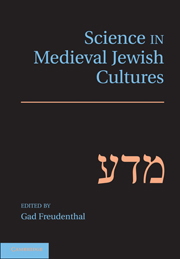Book contents
- Frontmatter
- Contents
- Contributors
- Preface and Acknowledgments
- Introduction: The History of Science in Medieval Jewish Cultures
- Part I The Greek-Arabic Scientific Tradition and Its Appropriation, Adaptation, and Development in Medieval Jewish Cultures, East and West
- Part II Individual Sciences as Studied and Practiced by Medieval Jews
- 5 Logic in Medieval Jewish Culture
- 6 Astronomy among Jews in the Middle Ages
- 7 Interactions between Jewish and Christian Astronomers in the Iberian Peninsula
- 8 The Hebrew Mathematics Culture (Twelfth–Sixteenth Centuries)
- 9 Mathematical and Physical Optics in Medieval Jewish Scientific Thought
- 10 The Evolution of the Genre of the Philosophical-Scientific Commentary
- 11 Latin Scholastic Influences on Late Medieval Hebrew Physics
- 12 Meteorology and Zoology in Medieval Hebrew Texts
- 13 The Mental Faculties and the Psychology of Sleep and Dreams
- 14 Toward a History of Hebrew Astrological Literature
- 15 Astrology in Medieval Jewish Thought (Twelfth–Fourteenth Centuries)
- 16 Astral Magic and Specific Properties (Segullot) in Medieval Jewish Thought
- 17 Medicine among Medieval Jews
- 18 Alchemy in Medieval Jewish Cultures
- 19 The Science of Language among Medieval Jews
- Part III Scientific Knowledge in Context
- Name Index*
- Subject Index*
- References
19 - The Science of Language among Medieval Jews
from Part II - Individual Sciences as Studied and Practiced by Medieval Jews
Published online by Cambridge University Press: 05 June 2012
- Frontmatter
- Contents
- Contributors
- Preface and Acknowledgments
- Introduction: The History of Science in Medieval Jewish Cultures
- Part I The Greek-Arabic Scientific Tradition and Its Appropriation, Adaptation, and Development in Medieval Jewish Cultures, East and West
- Part II Individual Sciences as Studied and Practiced by Medieval Jews
- 5 Logic in Medieval Jewish Culture
- 6 Astronomy among Jews in the Middle Ages
- 7 Interactions between Jewish and Christian Astronomers in the Iberian Peninsula
- 8 The Hebrew Mathematics Culture (Twelfth–Sixteenth Centuries)
- 9 Mathematical and Physical Optics in Medieval Jewish Scientific Thought
- 10 The Evolution of the Genre of the Philosophical-Scientific Commentary
- 11 Latin Scholastic Influences on Late Medieval Hebrew Physics
- 12 Meteorology and Zoology in Medieval Hebrew Texts
- 13 The Mental Faculties and the Psychology of Sleep and Dreams
- 14 Toward a History of Hebrew Astrological Literature
- 15 Astrology in Medieval Jewish Thought (Twelfth–Fourteenth Centuries)
- 16 Astral Magic and Specific Properties (Segullot) in Medieval Jewish Thought
- 17 Medicine among Medieval Jews
- 18 Alchemy in Medieval Jewish Cultures
- 19 The Science of Language among Medieval Jews
- Part III Scientific Knowledge in Context
- Name Index*
- Subject Index*
- References
Summary
LINGUISTICS
The nature and development of medieval Hebrew linguistics have always held a place of honor in Hebrew and Jewish studies. Grammatical and lexicographical treatises were among the earliest Hebrew works printed and studied in early modern universities. A peak of research activities occurred in the second half of the nineteenth and early twentieth centuries, when a wealth of grammatical texts were edited from original manuscripts and the first historical syntheses were compiled. More recently, the past two or three decades have also witnessed a considerable increase in the number and quality of research projects and publications dedicated to medieval Hebrew linguistics. This resurgence is due to several factors, of which the most important concern the recognition of the history of linguistics in general as a discipline in itself, on the one hand, and the renewal of interest in medieval manuscripts, on the other. Thanks to these factors, the study of the earliest stages of Oriental Hebrew linguistics has recently gained added impetus with the discovery of previously unknown books and fragments, chiefly in the Firkovich collection in St. Petersburg and among fragments from the Cairo Geniza. In addition, the better-known works of “classical” grammarians and various works written in Western Europe have recently been “rediscovered,” studied, and critically edited from original manuscripts.
These new discoveries and scholarly publications confirm that Hebrew linguistics was far from marginal a science during the Middle Ages: Some 150 linguistic works are known today (see Tables 19.1–19.3); around 2.5 percent of all surviving Hebrew manuscripts deal with grammar. Linguistic texts and ideas traveled at great speed between different countries and communities. From its inception, the science of Hebrew grammar was a relatively neutral meeting ground for proponents of different ideas and beliefs. Particular aspects of grammatical analysis could sometimes become controversial, as in the case of the rivalry between Menaḥem ben Saruq and Dunash Ibn Labrāṭ in Cordoba, in the tenth century, or between Judah Ibn Janāḥ and Samuel ha-Nagid some fifty years later. Nevertheless, Hebrew grammar appeared devoid of overt ideological challenges of the kind raised by other human sciences, such as theology, exegesis, jurisprudence, and philosophy; there was a fruitful exchange of linguistic ideas between Karaites and Rabbanites, and free use was made of the Arabic linguistic tradition as the chief model for the description of the Hebrew language. In the early period of its development, linguistics did not meet with serious opposition even from those circles hostile in principle to “foreign” sciences. Admittedly, in later periods, some scholars described disciplines such as grammar or medicine as a pure waste of time, but most others considered it to be indispensable either for the correct interpretation of texts or as the very condition of human communication. Medieval Hebrew linguistics was consequently an important and prolific discipline, building on and attesting to intellectual contacts with the non-Jewish environment. At the same time, this discipline claimed a role in the Jewish curriculum, in the light of its postulated primordial role for the interpretation of sacred texts.
- Type
- Chapter
- Information
- Science in Medieval Jewish Cultures , pp. 359 - 424Publisher: Cambridge University PressPrint publication year: 2012
References
- 2
- Cited by

